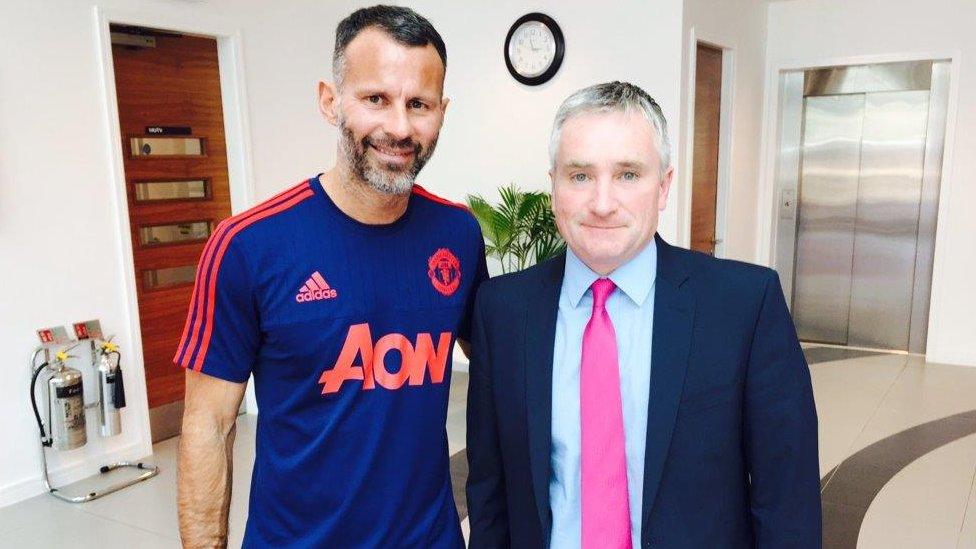Adrian Doherty: Manchester United's lost star
- Published
Remembering lost star Adrian Doherty
I arrived at the Manchester United training ground at Carrington last September with cameraman John Morrissey and we were ushered into a media room.
A short time later a reporter or producer from MUTV (the club's TV channel) came bursting through the door and asked us if we'd heard the exciting news. David de Gea had just signed a four year extension to his United contract and the place was buzzing.
My heart sank. We've no chance of getting an interview with Ryan Giggs now, I recall thinking. He'll be too busy handling media interviews about the Spanish goalkeeper's decision to stay at Old Trafford.
But half an hour later, Giggs bounded into the room all smiles and keen to talk about his former team mate Adrian Doherty. More than twenty five years on, his face lit up at the mention of Adrian.
Giggs was tall and lean and described Adrian Doherty as skinny, but it wasn't an insult. It was his way of conveying how impressed he was about the 15-year-old Strabane lad's ability, given his diminutive stature.
Adrian Doherty was shy and even described by some as eccentric but boy, could he play.
"As a player he was electric. His speed off the mark was frightening really, and he had great balance right and left foot," said Giggs.
"I would play on the left and he would play on the right. We were quite similar. We liked to beat people but probably the thing that sticks out is his bravery.
"He wasn't big like me, he was quite skinny, a small frame, but he would just take the ball and it didn't matter if it was a centre half going through the back of him or tackling him, fouling him, he would just get up and demand the ball again."
Adrian came from the small town of Strabane in County Tyrone, Northern Ireland, and his was a family immersed in soccer. His father, Jimmy, had played at senior level for Derry City Football Club.
It was after a trial for Manchester United in the late 1980s that Jimmy received a phone call. It was Sir Alex Ferguson.
The United supremo told him that his son "ticked all the boxes" and that he had no apparent weaknesses to work on.
It was not long before he signed for his boyhood idols.
But the winger had another creative side to his character. He loved poetry and music, especially Bob Dylan, and would play his guitar around Old Trafford and the training ground at 'The Cliff'.
And all the time he was taking his rise up the United ranks in his stride. Adrian was on the verge of making his debut for United on several occasions around 1990 when he was just sixteen.
But a serious knee injury forced him out of the game and he never fully recovered. He drifted out of the game and ended up at The Hague in Holland.
Tragically he fell into a canal on 7 May 2000. He could not swim and had a phobia about water.

Ryan Giggs said Adrian's pace was "frightening"
He was pulled out unconscious and lay in a coma for almost five weeks before passing away on 9 June, it was just a day before his 27th birthday.
Oliver Kay, the chief soccer writer with The Times who has written a book about his life said Dutch police were treating his death as a tragic accident.
Kay had originally been researching an article on Ryan Giggs when he came across the stories about Adrian's talent.
"He was eccentric by football standards. You generally would have footballers wearing their designer labels and rushing to buy themselves a car after their first professional contract," said Kay.
"Not only did he walk everywhere with his guitar, he cycled everywhere and cycled to training on what I'm told was not a good bike but a second hand bike.,, a rusty old thing without gears and his team mates would look at it and say 'What's this?'"
"He was completely anti-materialistic," said Kay.
"He'd buy second hand clothes and turn up in ripped old sweaters and ripped old jeans, not to look cool but just because that's what he had, what he was comfortable in and I think a lot of the players and coaching staff just couldn't get their heads around this.
"His talent was extraordinary, his personality was eccentric and completely unlike that of any other footballer."